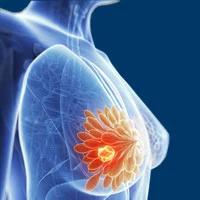Abemaciclib Significantly Improves iDFS in High-Risk HR+ Early Breast Cancer
Abemaciclib in combination with standard adjuvant endocrine therapy demonstrated a significant improvement in invasive disease-free survival compared with endocrine therapy alone in patients with high-risk, HR-positive, HER2-negative early breast cancer.

Abemaciclib (Verzenio) in combination with standard adjuvant endocrine therapy demonstrated a significant improvement in invasive disease-free survival (iDFS) compared with endocrine therapy alone in patients with high-risk, hormone receptor (HR)–positive, HER2-negative early breast cancer, meeting the primary end point of the phase 3 monarchE study (NCT03155997).1
Results, which are from a pre-planned interim analysis of the trial, also showed that the safety profile with the CDK4/6 inhibitor was consistent with what has been observed in prior studies with the agent. Eli Lilly and Company, the manufacturer of abemaciclib, stated in a press release that it plans to present the findings at an upcoming medical meeting.
"When a person is diagnosed with high-risk early-stage breast cancer, they strive to do everything in their power to prevent a recurrence. And as clinicians, we have the same goal," Maura Dickler, MD, vice president of oncology, late-phase development, Lilly Oncology, stated in the press release. "monarchE was intentionally designed for people whose breast cancer is at a high risk of returning. We are incredibly excited by the results of monarchE and that we can potentially offer a new treatment option for patients with high risk HR-positive, HER2-negative early breast cancer. This would not have been possible without the tremendous commitment from the people who participated in this trial."
monarchE will continue through its June 2027 completion date. At the time of the interim analysis, the iDFS results are considered definitive. All patients enrolled on the study will be followed until the primary analysis and beyond to assess for overall survival (OS) and additional endpoints, Lilly added in the press release.
An estimated 30% of patients with HR-positive, HER2-negative early breast cancer are at risk for disease recurrence. The recurrence risk increases based on certain clinical and/or pathological features, such as lymph node metastases, a large tumor size, and a higher tumor grade. Moreover, novel therapeutics are still needed to help prevent disease recurrence in these patients.
In the multicenter, randomized, open-label, phase 3 monarchE trial, investigators enrolled 5637 patients with high-risk, node-positive, HR-positive, HER2-negative early breast cancer. High-risk status was defined as women of any menopausal status and men with resected HR-positive, HER2-negative invasive early disease with either 4 or more pathologically positive axillary lymph nodes (pALNs) or 1 to 3 pathological pALNs, with at least 1 high-risk feature, which includes: a primary invasive tumor size of 5 cm or greater, a histological grade 3 tumor, or a central Ki-67 index of 20% or higher. Patients must have also completed adjuvant chemotherapy and radiation prior to enrolling, if applicable, and should have recovered from all acute adverse effects.
Patients were randomized 1:1 to receive standard adjuvant endocrine therapy alone or in combination with abemaciclib at 150 mg twice daily. Patients on the abemaciclib arm receive treatment for up to 2 years or until discontinuation criteria are met, and all patients receive standard endocrine therapy for at least 5 years if thought to be appropriate.
The primary end point is iDFS, while secondary end points include distant relapse-free survival, OS, safety, pharmacokinetics, and health outcomes.
"We're proud that Verzenio has already treated tens of thousands of people around the world who are living with HR-positive, HER2-negative advanced breast cancer," Anne White, president of Lilly Oncology, stated in the press release. "And now Verzenio in combination with endocrine therapy has demonstrated positive results in people with high-risk HR-positive, HER2-negative early breast cancer—a major milestone with the potential to change the paradigm of how early breast cancer is treated and a first for the CDK4 & 6 inhibitor class. The fact that these results were achieved early, at the interim analysis, is also exciting because it will help us speed this innovation to people who need it. We look forward to submitting these data to regulatory authorities before the end of 2020."
Abemaciclib is currently approved by the FDA for use in combination with an aromatase inhibitor, as initial endocrine-based therapy, for postmenopausal women with HR-positive, HER2-negative advanced or metastatic breast cancer; in combination with fulvestrant (Faslodex) for patients with HR-positive, HER2-negative advanced or metastatic breast cancer who have disease progression following endocrine therapy; and as monotherapy for women with HR-positive, HER2-negative advanced or metastatic breast cancer who experience disease progression following endocrine therapy and prior chemotherapy in the metastatic setting.
In the phase 3 MONARCH 2 trial, the addition of abemaciclib to fulvestrant led to a median 9.4-month OS benefit compared with fulvestrant with placebo in patients with HR-positive, HER2-negative advanced breast cancer who progressed on prior endocrine therapy.2 The results, which were presented at the 2019 ESMO Congress, showed that the median OS with the combination of abemaciclib and fulvestrant was 46.7 months compared with 37.3 months for placebo/fulvestrant at a median follow-up of 47.7 months (HR, 0.757; 95% CI, 0.606-0.945; P = .01).
References:
- Verzenio (abemaciclib) significantly reduced the risk of cancer returning in people with high Risk HR+, HER2- early breast cancer [news release]; Indianapolis, IN. Eli Lilly and Company. Published June 16, 2020. Accessed June 16, 2020. https://bit.ly/2YIcaSn.
- Sledge Jr GW, Toi M, Neven P, et al. The effect of abemaciclib plus fulvestrant on overall survival in hormone receptor—positive, ERBB2-negative breast cancer that progressed on endocrine therapy—MONARCH 2: a randomized clinical trial. JAMA Oncol. 2020;6(1):116-124. doi:10.1001/jamaoncol.2019.4782



